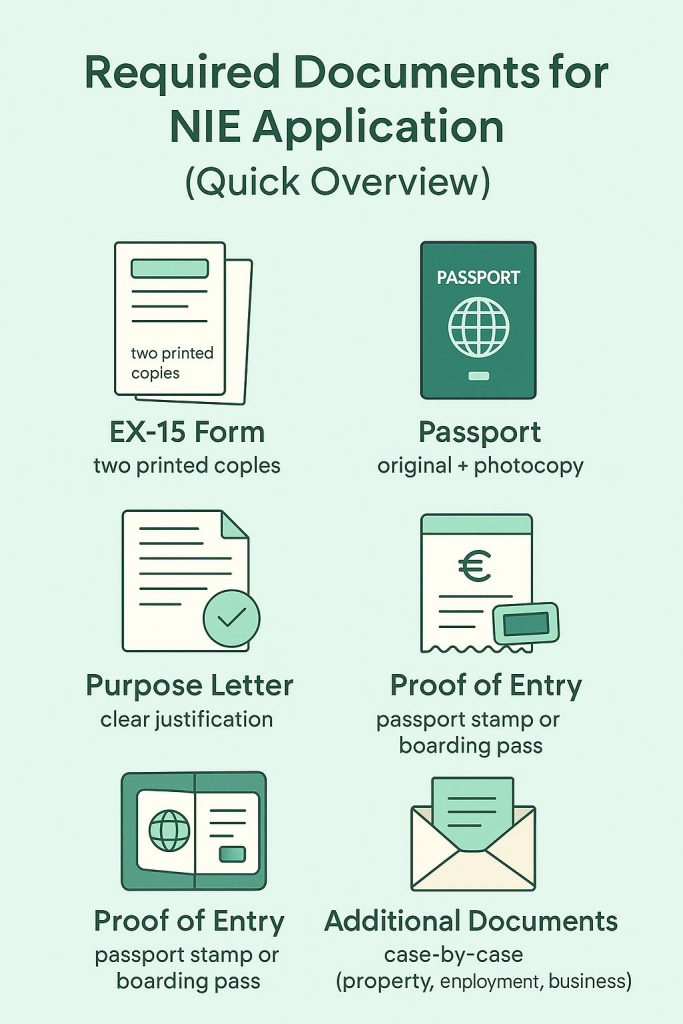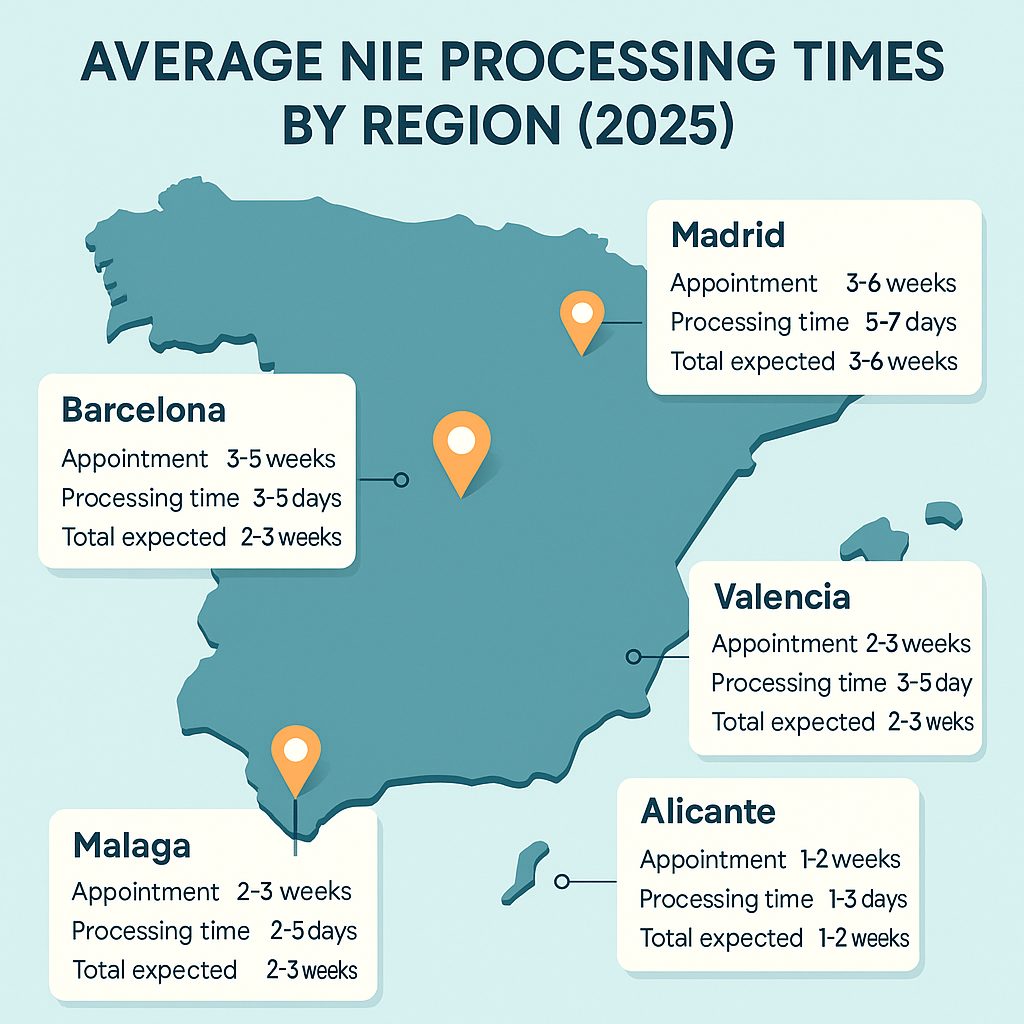Let’s be honest from the start: nothing in Spain truly begins until you have your NIE. Not the bank account you promised yourself you’d open on Monday. Not the apartment your agent swears will be gone by Tuesday. Not the utilities, the notary appointment, the business registration, or even the friendly mobile‑data plan you wanted “just for a week.”
We write this guide not from theory, but from the ground. From years of helping people who arrived full of enthusiasm, only to hit the inevitable moment when a polite Spanish official tilted their head slightly and asked: “¿Tiene NIE?” And everything stopped.
So here is the closest thing to a clear, straightforward, no‑nonsense explanation. No robotic language. No cold official tone. Just a company that’s walked through this process hundreds of times and knows exactly where people hesitate, where they get stuck, and where the system becomes surprisingly easy — once you understand how it thinks.
What the NIE Actually Is (And Why Spain Treats It Like Gold)
The NIE — Número de Identidad de Extranjero — is a personal identification number for foreigners. Not a card. Not a residency permit. Not a visa. Just a number. And yet, in Spain, this number behaves like a master switch: once it’s issued, everything else wakes up and starts working.
The funny part? The number itself never expires. Ever. You could get it at 25, move away for ten years, and return at 35 — your NIE will be waiting like a patient, slightly bureaucratic friend.
People often confuse NIE with TIE. The TIE is a physical card that includes fingerprints, a photo, and proof of legal residency. The NIE is the number that appears on that card, long before anyone prints it.
Spain loves structure. First, the number. Then the card — but only if you actually become a resident. Until then, you walk around with a simple A4 paper that officials treat with surprising reverence.
Who Needs an NIE? Spoiler: Almost Everyone
We’ve seen every type of client over the years — remote workers, retirees escaping the cold, investors, families, students, people who “just came for two weeks but… actually maybe I’ll buy something here.” And in 90% of the cases, the NIE appears as if summoned by a bureaucratic spell.
Buying property? NIE.
Opening a bank account? NIE.
Finalizing your work contract? NIE.
Registering with Social Security? NIE.
Setting up utilities? Again — NIE.
You don’t need to be a resident, or even planning to be one. Spain requests this number whenever money, signatures, or long-term decisions are discussed.
The Documents You’ll Actually Need (and the Logic Behind Them)

Spanish bureaucracy, unlike its reputation, is surprisingly consistent once you see the pattern. Every document corresponds to a specific question or concern the officer might have.
- EX‑15 form: “Are you formally requesting the number?”
- Passport + copy: “Are you who you say you are?”
- Purpose: “Why do you want this number?”
- Modelo 790 (paid): “Are you following procedure?”
- Proof of legal entry (if inside Spain): “Are you here legally right now?”
Show the system clarity, and the system works.
Required Documents Summary Table
| Document | Required? | Notes |
|---|---|---|
| EX-15 form | Yes | Two copies, Spanish only |
| Passport | Yes | Original + photocopy |
| Purpose justification | Yes | Must be specific and supported |
| Modelo 790 (paid) | Yes | Bank-stamped receipt required |
| Proof of entry | If applying inside Spain | Passport stamp or boarding pass |
| Additional documents | Case-by-case | Employment, property, study, business |
Filling Out the EX‑15 (Yes, It’s in Spanish — No, There’s No English Version)
The EX‑15 feels intimidating at first glance, mostly because it’s unapologetically not bilingual. But after the first two lines, it becomes surprisingly simple.
Surname first. Then your given name. Don’t fill the NIE field. Add both parents’ names — this is tradition in Spain, don’t fight it. And when you reach the “purpose” section, tell the truth, but tell it clearly. “To buy a property in Málaga,” for example, sounds infinitely better than “for personal reasons.”
Pro tip: Don’t sign the form at home. Police stations have an unwritten rule: signatures happen in front of the officer.
Where to Apply — and Why the Choice Matters
You have three paths:
Apply inside Spain, apply through a consulate abroad, or empower someone to apply on your behalf. Each path has its personality.
Applying Inside Spain
You book a cita previa online — a ritual almost every immigrant remembers vividly:
https://sede.administracionespublicas.gob.es/icpplus/
Madrid and Barcelona are famously overbooked. Slots appear and vanish like shooting stars. But smaller towns? Often a delight. A quiet office, a short line, and sometimes — same‑day issuance.
On the day itself, you bring your little dossier of documents. The officer checks them, occasionally asks one or two questions, stamps the essential parts, and that’s it.
Pro tip: The 8:00–9:00 window is prime time for cancelled appointments to reappear.
Applying Through a Consulate
If you’re not in Spain yet, this is your doorway. But no two consulates operate the same way. Some are lovely and fast. Others are… educational. Expect timelines from two to six weeks.
Applying Through a Legal Representative
When someone is buying property on a deadline, this is usually the winning move. A notarized (and sometimes apostilled) power of attorney allows your representative to do everything — book, apply, and collect.
Not the cheapest option, but arguably the calmest.
The Appointment: Inside the Room
If you imagine a dramatic interview, erase that. Most NIE appointments feel like a slow, polite, predictable rhythm.
Documents. Check.
Purpose. Check.
Payment receipt. Check.
Signature. Check.
If everything aligns, the officer simply nods and tells you when the certificate will be ready. If something doesn’t align, they’ll say so plainly. There’s no mystery — only missing paperwork.
Pro tip: Bring more copies than you think necessary. Spain never punishes enthusiasm for documentation.
Processing Times: The Secret Geography of Spanish Bureaucracy

Every region has its own tempo. Madrid moves with the intensity of a capital city. Barcelona reacts like a busy port. Málaga and Valencia work steadily. Alicante, for reasons known only to itself, is often impressively fast.
Processing Times by City
| City | Appointment Wait | Processing Time | Total Expected Time |
|---|---|---|---|
| Madrid | 2–4 weeks | 5–10 days | 3–6 weeks |
| Barcelona | 2–3 weeks | 5–7 days | 3–5 weeks |
| Valencia | 1–2 weeks | 3–5 days | 2–3 weeks |
| Malaga | 1–2 weeks | 2–5 days | 2–3 weeks |
| Alicante | 3–7 days | 1–3 days | 1–2 weeks |
Summer slows everything. Clear documentation speeds everything. Purpose matters — employment and property cases often move faster.
The Mistakes We See Most Often (Learn From Them, Please)
Every week, someone walks into our office with the same story: “I thought the system would be flexible.” It rarely is.
The most common errors? Names written in the wrong order. Purpose letters are too vague. The Modelo 790 was paid incorrectly or without a bank stamp. Booking the wrong appointment type. Or arriving late, which Spain treats as a silent cancellation.
Pro tip: If an officer rejects something, ask why. The clarity of their answer usually reveals the exact fix.
After You Finally Have Your NIE
This is the moment everything wakes up.
Open the bank account.
Sign the property deed.
Get your Social Security number.
Apply for residency if that’s your path.
Set up electricity, water, internet, the whole modern life package.
The NIE does not change. Ever. You’ll carry the same number through every future process in Spain.
Keep a clean digital copy. Keep the original in a safe place. You may not need it often, but when you do, you’ll want it in perfect condition.
Official Sources (For Cross‑Checking)
- Ministry of Interior: https://www.interior.gob.es/
- Official appointment portal: https://sede.administracionespublicas.gob.es/icpplus/
Mini FAQ
1. Can I get an NIE in one day?
Yes — usually in smaller towns, rarely in big cities.
2. Does the NIE expire?
The number never does. The paper certificate may age, but it can be reprinted.
3. Do children need an NIE?
Only in legal, property, or residency scenarios.
4. Can someone accompany me to translate?
Yes. Officers care about clarity, not language tests.
5. Will my NIE change when I become a resident?
No. It follows you onto every future document.
6. Can I travel while awaiting the NIE?
Absolutely. Your passport governs your entry rights, not your NIE.
7. What if I miss my appointment?
You may get temporarily blocked from rebooking locally.
Final Thoughts (From a Company That Sees This Process Daily)
Spanish bureaucracy isn’t as mysterious as it looks — just particular. When you understand what officers expect, the NIE becomes one of the simplest steps in your entire relocation or investment journey.
And yes, the process requires patience. A bit of timing. A bit of document discipline. But once the NIE is in your hands, the entire system unlocks.
If you need help, guidance, or professional representation, our team handles the entire process for you. You can learn more about our streamlined NIE service here: NIE Spain Online. We navigate the appointments, translate the requirements, handle the paperwork, and keep the process moving so you don’t lose time (or opportunities).
Welcome to Spain — paperwork first, life second. But once the paperwork is done, the life part becomes absolutely worth it.
Last updated: 15.11.2025